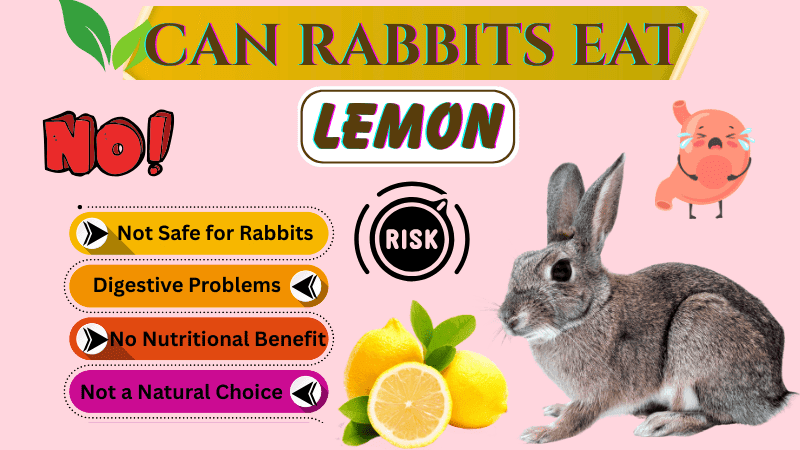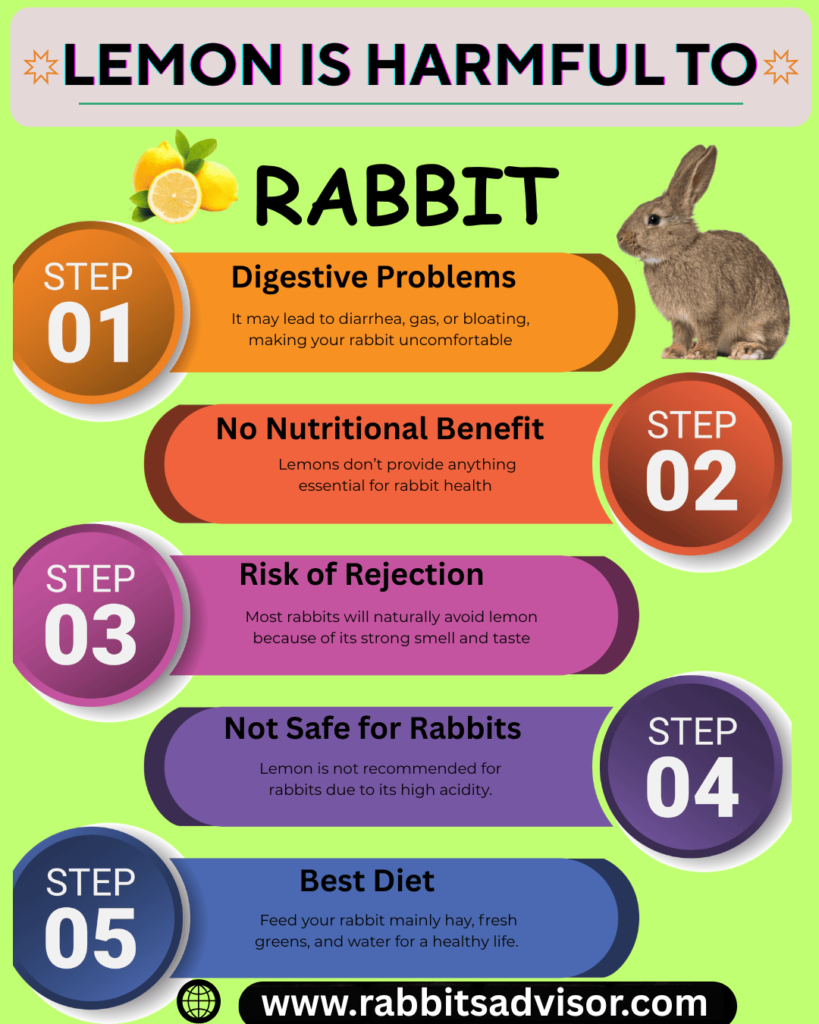Can rabbits eat lemons? Sorry! Giving lemon fruits to rabbits is not ok. But, you can only give your rabbits a small number of citrus fruits. Typically, Rabbits don’t even enjoy the flavor of lemon.
You must constantly be mindful of how much citrus food you should offer your rabbits as a pet owner. Rabbits don’t think lemons are poisonous. But, as you know that citric acid is present in them. Therefore, overfeeding lemon to rabbits may arise many health problems.

From this post, our experts will tell you whether rabbits should eat lemons. We’ll also go over the dangers, the best options, and a lot more.
Is Lemon Safe For Rabbits to Eat?
Resounding answer, No! Lemon is extremely harmful to rabbits; so you must never allow them to eat any of it.
Also Read: Can Rabbits Eat Eggplant (Leaves + Skin + Raw)? Full Guide
Because lemons are made of citric acid, they have a high acidity. If fed in small amounts, then it is excellent for rabbits.
It is well known that rabbits have one of the weakest digestive systems in the world. One small mistake can turn out to be lethal.
Eating lemons can ultimately lead to a digestive tract imbalance in your rabbit. And, it could harm the poor thing.
Your rabbit will begin to collapse as a result of this poisoning; and eventually stop responding.
Health Benefits of Lemons for Rabbits
Rabbits may benefit from lemons in a number of ways. Their high nutritional value supports a stronger immune system, better digestion, and overall well-being.
Better Digestibility
Lemons’ citric acid promotes the formation of digestive juices, which helps break down food and gets a healthy digestive system. Constipation and other digestive problems are avoided by the fiber content. Along with, it also helps to control bowel motions.
Supportive for Immune System
Vitamin C is a potent antioxidant that fortifies the immune system. Vitamin C keeps rabbits strong and healthy by warding off illnesses and infections.
Nutritional Profile of Lemons for Rabbits
As human-being, you well known that lemon is nutrient-dense citrus fruit. Other than, this fruit is also rich several essential vitamins, minerals, and antioxidants. As told above, Vitamin C is an antioxidant that strengthens the immune system and guards against cell damage.
Also Read: Can Rabbits Eat Cantaloupe (Rind + Skin + Seeds)? Yes or Not
Significant levels of potassium promote heart health, and folate that is necessary for the synthesis of red blood cells.
Vitamin C
One medium-sized lemon has about 51 milligrams of vitamin C make them a great source of this important mineral. A potent antioxidant, vitamin C aids in shielding the body from harm brought on by free radicals. Moreover; it also requires for the synthesis of collagen, a protein that is vital for strong bones, blood vessels, and skin.
Potassium
One medium-sized lemon has about 106 milligrams of potassium that making them a healthy source of the mineral. Potassium is a necessary mineral that maintains appropriate blood pressure. Along with, it also aids in controlling the body’s fluid balance.
Folates
One medium-sized lemon has about 19 mcg of folate that making them a decent source of the vitamin. A B vitamin called folate is necessary for the synthesis of DNA and red blood cells.
Why Rabbits Should Not Eat Lemons? Risks
Despite their seemingly innocuous appearance; lemons can be dangerous to rabbits.

High Acidity: With a pH of about 2.0, lemons are quite acidic. Due to their sensitive digestive systems, rabbits may get diarrhea and stomach issues. Or, even intestinal stasis if they eat acidic meals.
Absence of Fiber: A rabbit’s digestive system depends on fiber, but lemons lack. Constipation and obesity are two digestive issues that can result from a diet low in fiber.
Toxic Substances: Psoralens named substance that is found in lemons. They can upset a rabbit’s stomach and its kidneys.
Lemons can also pose a choking hazard to rabbits, if, they consume their skin or seeds.
Can Rabbits Eat Lemon Peels/Skin Safely?
As per dietary expert, rabbits shouldn’t be given lemon peels. There is no nutritional value in lemon peels for rabbits.
Also Read: Can Rabbits Eat Ginger Root and Juice? Risks and Benefits
The health of rabbits must always be a concern, and lemon peels have more citric acid than meat. Lemon peels have the potential to induce interior obstruction.
For these reasons; don’t give your bunnies lemon peels.
Can Rabbits Eat Lemon Seeds?
Here, our reply will be again ‘NO’! You should never offer lemon seeds to rabbits. It could unintentionally choke a rabbit.
In the worst situation, the veterinarian would have to have it surgically removed.
Other than, thick layer of lemon peel may obstruct a rabbit’s digestive system, resulting in bloating and eventually, death.
Due to their extreme sensitivity, rabbits are particularly vulnerable to these regrettable events.
Bad Reactions of Stomach Upset in Rabbits
Your rabbit may show symptoms of gastrointestinal distress; if they have eaten lemons or any other dangerous foods, including:
- Appetite loss
- Having diarrhea
- Laziness
It is imperative that you seek the counsel of a veterinarian regarding treatment choices. Along with, avoid future problems if you observe these symptoms in your rabbit.
How Do You Introduce New Foods to Rabbit?
It’s crucial to introduce new items to your rabbit’s diet gradually. Offer them little amount to avoid upset stomach:
Also Read: Can Rabbits Eat Garlic? Chives, Leaves, Powder, & Mustard
Start by giving 1-2 tablespoons of the new food for every pound of body weight.
If you observe any negative reactions, quickly stop giving the new meal. And, always keep an closed eye on symptoms of their illness.
You can raise the amount over a few days or weeks; if your rabbit responds well to the new meal.
See a veterinarian for specific guidance if you’re not sure whether to add a new food to your rabbit’s diet.
Best Alternative of Lemon to Your Rabbits
Whenever you seem that rabbits deny to eating lemon, then never force to feed them. In this time, you can choose other right alternative of lemon, including:
FAQs (Frequently Asked Questions)
Do Rabbits Like Lemon Smell?
For your knowledge, most of time rabbits always avoid the strong aroma like lemons.
Citrus peels are sometimes using as a repellent to keep rabbits away from particular plants or regions.
Although, individual rabbits can respond differently
Can Baby Rabbits Have Lemon?
As a pet owner, you must know about baby rabbit that has sensitive digestive system. For this, you should not feed them lemons. Lemons’ high acidity and sugar content can cause stomach distress. Make sure your children only eat rabbit-safe meals.
Can Rabbits Eat Lemon Leaves?
Here, our answer is ‘YES’! Lemon leaves are edible to rabbits. They are non-toxic and safe for your pet. However, because they are sour, they might not enjoy the flavor.
A rabbit’s diet should always be gradually expanded to include new items, such as lemon leaves.
Can Rabbits Consume Lemons Juice?
Once again, NO! Lemon juice is not safe for rabbit’s well being. Its strong acidity can cause discomfort or diarrhea by upsetting their delicate digestive tract.
Their health could be harmed by even tiny doses. For their well-being, stick your diet to fresh water and vegetables that are safe for rabbits.
For their safety, completely cut out citrus fruits and liquids from their diet.
Can Rabbits Intake Lemon Tree Branches?
Rabbits enjoy chewing. It’s true. However, is it safe for them to eat the branches of lemon trees? No, is the response.
Like all citrus trees, lemon trees produce psoralens and essential oils that are poisonous to rabbits.
If consumed them by your pet, then may result in upset tummies or even more severe health issues.
Can Rabbits Eat Lemon Balm?
Ensure, you can offer lemon balm to your rabbits, but in little amount. This plant is beneficial to rabbits for its relaxing effects and subtle lemon aroma. Lemon balm is packed with antioxidants that eases tension and aids in digestion.
Serve it as part of a balanced meal, fresh, and without pesticides. Steer clear of overfeeding to preserve healthy, balanced nourishment.
What Should You Do If Rabbit Accidentally Eats Lemon?
It’s recommended to keep always observing any symptom of digestive problems as suddenly eating lemon. If symptoms appear, ask your veterinarian for guidance.
Final Thoughts: Can Rabbits Eat Lemons?
Can rabbits eat lemons, then? The answer is that rabbits can consume lemons, but moderation is key. As you gradually add lemons to your rabbit’s diet, keep an closed eye for any signs of gastrointestinal distress.
Also Read: Can Rabbits Eat Oats and Oatmeal? A Complete Guide
Ensure your rabbit is receiving the best care possible, talk with your veterinarian before making any dietary adjustments. We appreciate you reading!
Have a Nice Day!!



